|
Below you will find our last posts until after Easter. We will be spending our Holy Week quietly with our family in preparing for the great feast of Easter. Thank you all for your comments. I regret that I'm unable to answer them all but know that I appreciate hearing from you. May you all have a fruitful Holy Week and a blessed feast of Easter. The Willson Family
0 Comments
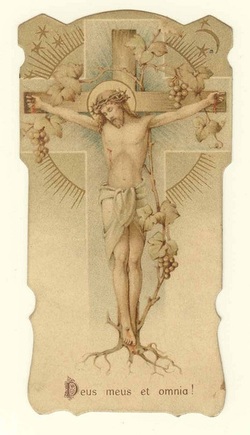 Today the crucifix, which each home is certain to possess and which was put away on Passion Sunday in unison with the custom in the churches, could be brought out again, and this time, during the whole day, placed in the most prominent position in the house. Until very recent times Good Friday was a day of strict fasting, and many people alive now can remember that as children they were allowed no milk and no butter. This, however, was mild in comparison with the fasts of their grandparents. Today, when fasting in Lent has been, nearly abolished, one could still make some sacrifice. One of Christ's sufferings on the cross was that of thirst; we could all go without drinking anything on this day; or we could sacrifice one meal. But one has to realize that any outward thing like fasting has to be equaled by an attempt at interior fasting from deliberate failings or imperfections; otherwise it is simply hypocrisy. THE WAY OF THE CROSS It was a Spanish Dominican who first set up in his Church pictures of Christ's journey to Calvary and who thus began one of the most popular practices of the Church and one which most people follow in Lent and Holy week, even if erratically. To make the way of the cross pictures are not essential it is only the wooden crosses over the pictures that are necessary. Not only are pictures unessential but so are any set prayers, such as the our Father, Hail Mary and Gloria commonly said at each station. The essence of the practice lies simply in uniting yourself with Christ in his passion, pondering on all that took place on the road to Calvary, and on moving from one station to the next as you do so. This is not so difficult. The devotion is not meant to be a pious lamentation nor an emotional wallowing. One can think how Mary and the apostles must have made the way of the cross after Christ's death. Their little pilgrimage must have been simplicity itself, the silence hardly broken "here is where he fell...here is where Simon helped him...here is where he died." That is the way to make the stations, simply, directly and without much speaking. It can even become a joyful devotion. There is the true story of the Passionist lay brother who always made the stations on Easter Sunday. Asked why he continued such an essentially Lenten practice into the joyful time of Easter, he said simply "I think of each station and all that happened, and then I say to our Lord, 'Now all that is over, now you are happy.'" - A Candle is Lighted, Imprimatur 1945 - 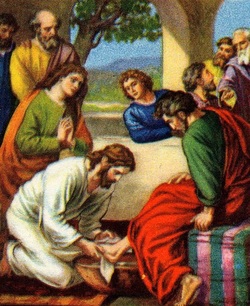 The last king in this country (England) who performed the office of washing the feet of the poor, in imitation of Christ, was James II. In the Catholic Church the custom has never died out and the Mandatum may be seen in many churches on Maundy Thursday. When Christ said to the apostles: "I have been setting you an example, which will teach you in your turn to do what I have done for you," he spoke to all Christians. Maundy Thursday therefore could be a special day when all Catholics deliberately set out to give their services to someone who needs help, and to do it in the spirit of Christ's self-forgetfulness. Such service should include the seeking out of someone who needs help. It might be looking after a child so that the mother could have a free evening, undertaking some mending or darning, humble, unostentatious things like that. What is more, such service might very well begin at close quarters, for in every home or school or club there must be someone who needs help, and such people, just because they are so close to us, can easily be overlooked. - A Candle is Lighted, Imprimatur 1945 - Divine Redeemer, make me to understand that afflictions here below are as flowers which promise to bear fruits of glory, and that our tears, like sacred oil, consecrate us to immortality.
- St. Gregory - 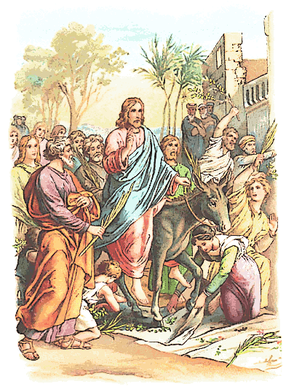 "It is called Palm Sunday because the palm betokeneth victory, wherefore all Christian people should bear palms in processions to signify that the Lord hath fought with the fiend, our enemy, and hath the victory over him." But palms are also used on this day in memory of the acclamations of the Jewish crowds on Christ's journey into Jerusalem and their waving of palm branches before him. Once it was the custom to have a palm procession with the Blessed Sacrament, before which the people waved green branches and sang Hosannahs. Occasionally, instead of the Blessed Sacrament the priest bore a copy of the New Testament which was intended to represent our Lord. Actual palm, of course, was not used. Box and willow branches, and sometimes yew, were all called palm. On this day, parties of boys or girls used to go out collecting willow. Everyone decorated their houses with it on Palm Sunday, while the church too was adorned. Generally the countryside is beautiful now, and nothing there is lovelier than the willow tree. This day could see family or school or club expeditions into the spring countryside to find willow branches both for their homes and for their parish church. Just before beginning the decorating of the house all could say this prayer, adapted from the ceremony of the blessing of the palms: "O God who didst bless the people who carried branches to meet Jesus; bless also these branches which we have gathered and with which we mean to honor thy name, so that wherever they are placed people may obtain thy blessing and may be protected from all adversity by thy right hand. Through Christ our Lord." - A Candle is Lighted, Imprimatur 1945 - O my Lord, may I receive in good part the strokes of Thy hand, and may I be content to see that Thou dost not spare my body from pains, for it is a great mark that Thou hast some good design over me.
- St. Lidwina - Oh how great a grace it is to love and to suffer, to love while suffering and to suffer while loving! Let us never lose one of our crosses, but let us often say to ourselves: Courage! the time of suffering is short, the love that suffering merits is eternal.
- Bossuet - 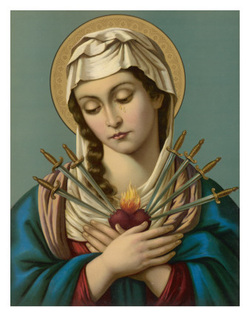 Tradition says that Mary, meeting her Son bearing His cross, fell under the weight of her anguish. Upon the place of this awful meeting a chapel was raised which took the name of St. Mary of the Spasm, and a feast was celebrated under the same name for several centuries. At the provincial Council of Cologne, in 1413, to rebuke the audacity of new heretics called Hussites, who had laid sacrilegious hands upon the images of Jesus Christ crucified and His holy Mother, was instituted the feast of the Commemoration of the Seven Dolors of the Blessed Virgin Mary, and its celebration was fixed for the Friday of Passion Week. This feast, substituted for that of the Spasm, or rather blended with it, and was eagerly accepted by the faithful. To represent the anguish of Mary, painters have shown her with her heart pierced with seven swords. According to Benedict XIV, this was the origin of the custom: Seven merchants of Florence withdrew to a mountain near that city, and there laid the foundation of the Order of Services, or Servants of the Blessed Virgin. These pious founders, in meditating on the sorrows of their august patron, discovered seven, of which some are found in the Gospel, and others are based on other pious reasons. These sorrows are: 1st, the prophecy made in the temple by the holy old man Simeon; 2nd, the flight into Egypt; 3rd, the loss of Jesus in Jerusalem; 4th, the meeting of Jesus and Mary on the way to Calvary; 5th, the crucifixion; 6th, the descent from the cross; 7th, the burial. In these seven swords we may believe that Christian art has wished to represent the abyss of sorrow into which the soul of Mary was plunged; the number seven being taken for universality. This is the translation of the words of Holy Scripture applied to Mary: "Thy sorrow is great as the sea" (Lament, ii. 13). - Catholic Ceremonies, Imprimatur 1896 - The good God tells us that at the last day He will wipe all tears from our eyes; and doubtless the more tears there will be to wipe away, the greater will be our consolation,
- Soeur Therese - 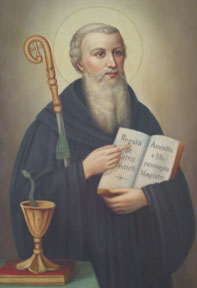 St. Benedict is the patron of bee-keepers, and those who themselves have bees could not do better than mark his day by praying for their hives. Farmers can pray for their cattle and their barns; fishermen for their fishing boats and the fish in the sea, why should bee-keepers do less? In some parts of France it was, and may still be, customary for bee-keepers to have a medal of St. Benedict affixed to their hives: "O Lord, God almighty, who hast created heaven and earth and every animal existing over them and in them for the use of men, and who hast commanded through the ministers of holy Church that candles made from the products of bees be lit in church during the carrying out of the sacred office in which the most holy Body and Blood of Jesus Christ thy Son is made present and is received; may thy holy blessing descend upon these bees and these hives, so that they may multiply, be fruitful and be preserved from all ills and that the fruits coming forth from them may be distributed for thy praise and that of thy Son and the holy Spirit and of the most blessed Virgin Mary." - A Candle is Lighted, Imprimatur 1945 - The best of all prayers is that in which we ask that God's holy will be accomplished both in ourselves and others.
- Venerable Louis of Blois - 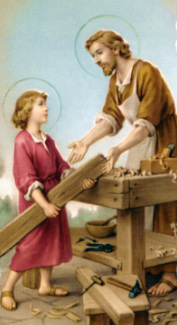 "Go to Joseph and do all that he shall say to you"; said Pharaoh, King of Egypt, to the famine-stricken people who came to buy corn in the land of plenty. This Joseph was the Hebrew to whom God had spoken in dreams, who had been sold a slave into Egypt by his own brethren, but who, because he was "full of the Spirit of God," was made Governor of the land. "Thou shalt be over my house ; without thy commandment no man shall move hand or foot in the whole land of Egypt," said Pharaoh the King. "And he clothed him with a robe of silk, put a gold chain about his neck, and a ring upon his finger, and had him proclaimed the saviour of the world! And the Lord blessed the land of Egypt for Joseph's sake." When the years of plenty had passed over the land, the famine came, as predicted, and continued for seven weary years. Then the very men who sold their young brother into bondage journeyed from Canaan toEgypt. They were starving. Money they had in plenty, but of food they had none, so they stood before the Governor who held the keys of all the granaries of Egypt. And he knew them; but there was no resentment in his heart. "Come nearer to me," he said. "God sent me before you that you might be preserved; God hath made me lord of the whole land of Egypt" and he pressed them to come down with their families and their flocks. "Come down to me; linger not, then I will feed you." And Pharaoh the King added his persuasion, "I will give you all the good things of the land of Egypt for Joseph's sake." Then Jacob and his children and their kinsfolk, their flocks and herds, came down to the land of Gessen, a land apart from the busy cities, and settled there, saying: "Only let my lord look favourably down upon us and we will gladly serve the King." But there was always a fear in the hearts of the ten brothers. Their crime had been so heinous; they could not believe Joseph had for given them. When, therefore, Jacob their old father died, they trembled lest Joseph, having nothing to restrain him, should revenge himself upon them. Such a thought was far from one in whom dwelt the "Spirit of God." "Fear not," he said; "I will feed you and your children." And he comforted them and spoke gently and mild to them. He kept his promise with princely munificence. Such was the man whom Israel loved "above all his sons." We know of another Joseph, a Hebrew likewise, one "full of the Spirit of God, a just man." To the first Joseph it was Pharaoh who spoke, and the dominion given was over a pagan, earthly kingdom. To the second it was God Himself Who spoke, and the dominion was over the treasures of Heaven Mary, Immaculate Mother, and Jesus, Son of God. The powers of the Patriarch of old were wonderful. God gave into his hands the sustenance of thousands of people. From his childhood upwards He spoke to him in dreams, and was with him throughout his whole career. To Joseph, son of David, God spoke in dreams likewise; He was with him "all the days of his life." He put under his protection the Virgin Mother and the little Saviour of mankind. It was Joseph who was their protector at Bethlehem, who planned their flight into Egypt, and nourished them there; who chose the place of their home. It was he to whom Jesus "was subject" during the hidden life. If Pharaoh's wisdom was shown in his choice of a governor for Egypt, is not God's wisdom shown in His choice of a guardian for Mary, a foster-father for Our Lord ? Will it be hard to guess at the virtues of Joseph, son of David, when we know those of the son of Jacob ? The Patriarch was powerful, prudent, mild and gentle, forgiving and long suffering, true to his word, faithful to his promises. We cannot suppose that the Patriarch of the Gospel, with his high calling, could be less powerful, prudent, or wise, less faithful to his promises, and less gracious. So we will come to him with our little troubles, our hopes and disappointments and our needs, spiritual and temporal, and we will ask him for protection, spiritual food, counsel, and help. He will help us with fatherly love if we trust him with childlike confidence. "Go to Joseph," is still the command, and "do all that he shall tell thee" that is, do as he did, be prudent as he, obedient, self-sacrificing, silent and humble as he; then will come to pass that other word: "I will give you all good things for Joseph's sake." - Saints and Festivals, Imprimatur 1913 - A coloring picture of St. Joseph can be found below.
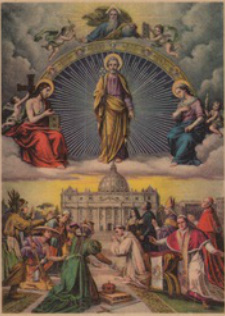 ST. JOSEPH of the royal blood of David, was a mechanic in Nazareth of Galilee, where he was espoused to the Blessed Virgin Mary. The gospel praises him very highly, calling him a just man, chosen by God from among men to be the foster-father of Christ who was subject to him as He was to His blessed Mother. The history of his childhood and youth has not been preserved, and of it, as of the rest of his life, we know only that which is related by the Evangelists. As we do not read that he was present at the marriage in Cana, it is supposed that before the commencement of Christ's ministry he died a happy death in the arms of Jesus and Mary. The Introit of the Mass reads: The just shall flourish like the palm-tree: he shall grow up like the cedar of Libanus: planted in the house of the Lord, in the courts of the house of our God. It is good to give praise to the Lord: and to sing to Thy name, O Most High! (Ps. xci.) Glory be to the Father &c. PRAYER OF THE CHURCH. Vouchsafe, O Lord, that we may be helped by the merits of Thy most holy Mother's spouse: that what of ourselves we can not obtain may be given to us through his intercession. Who &c. LESSON. (Ecclus. xlv. I 6.) He was beloved of God and men, whose memory is in benediction. He made him like the saints in glory, and magnified him in the fear of his enemies, and with his words he appeased monsters. He glorified him in the sight of kings, and gave him commandments in the sight of his people, and showed him his glory, he sanctified him in his faith and meekness, and chose him out of all flesh. For he heard him and his voice, and broughthim into a cloud. And he gave him commandments before his face, and a law of life and instruction. APPLICATION. What is here said of Moses, may justly be applied to St. Joseph, for which reason the Church chooses this lesson for his festival day. That St. Joseph was beloved of God, is shown by his being chosen the foster-father of the Son of God, Jesus Christ; his memory is in benediction, and how could it be otherwise than blessed. He was the foster-father of Him who from the commencement of the world, as its Creator, blessed all creatures, and who, by His death, as Redeemer, procured blessings and graces for us who, on account of our sins, deserved the curse of God. God has placed St. Joseph with the saints, and glorified him before all kings, for he was not only of royal blood, but he was foster-father to the King of kings. His humility, his purity and his faithful love of Mary enabled him while on earth to hear the tender voice of Jesus; God has also brought him into a cloud, that is, taken him up to heaven, where he now sees Him face to face, and is a most powerful intercessor for man. GOSPEL. (Matt. I. 18-21.) WHEN Mary, the mother of Jesus, was espoused to Joseph, before they came together, she was found with child of the Holy Ghost. Whereupon Joseph, her husband, being a just man, and not willing publicly to expose her, was minded to put her away privately. But while he thought on these things, behold the Angel of the Lord appeared to him in his sleep, saying: Joseph, son of David, fear not to take unto thee Mary thy wife, for that which is conceived in her is of the Holy Ghost. And she shall bring forth a Son: and thou shalt call his name Jesus: for he shall save his people from their sins. Why was the Blessed Virgin espoused to St. Joseph"? St. Jerome gives the following answer to this question: that by Joseph's descent from the house of David it might be established that Jesus and Mary belonged to the same line, for in the Old Law a woman was not permitted to marry out of her own tribe, when there were no male heirs; that Mary might not be stoned to death, as she would have been, if found unmarried with child ; that Christ might not be regarded as an illegitimate child and be, therefore, despised and repudiated; and that, as St. Ignatius the Martyr says, the birth of Christ thus, might remain concealed from the devil who, therefore, believed that Christ was not born of a virgin, but of a wife; finally, that Mary might have consolation and assistance, as at the time of the flight with Jesus into Egypt. Why did St. Joseph wish to leave Mary privately? Because he was not instructed concerning the divine mysteries, and could not from her pure, blameless life understand Mary's condition, and was too charitable to think or assert evil of her, or put her to shame. Why did not Mary reveal these mysteries to him'? Because of the humility which she loved so much that she would rather be suspected of evil than reveal the great grace which God had shown her; besides she also trusted that God Himself would care for her and make her innocence manifest. ON THE VENERATION OF ST. JOSEPH. ST. Alphonsus Liguori writes that the example of Christ who so highly venerated St. Joseph while on earth, and who during his whole life was obedient to him, should suffice to inspire all hearts with devotion to this great saint; and he, whom the King of kings placed so high, indeed deserves especial veneration from man. To encourage this veneration, St. Theresa wrote: "I do not remember that I ever prayed to St. Joseph for anything which he did not procure for me ; the great graces God has given me through him, and the many dangers of body and soul from which he has preserved me, are indeed truly wonderful. It seems as if God has given to other saints the grace to assist in some special manner those who seek their intercession; but of this glorious saint my experience is that he assists in every need. The Lord appears to show by this, that as He was subject to him on earth, so in heaven he does every thing which St. Joseph requests of Him. Others, whom I have advised to have recourse to him, have experienced the same thing. I would gladly so advise every one." "I have a great devotion to this saint," continues St. Alphonsus, "because I have so often experienced that he can obtain so much from God. For many years I have been accustomed to ask a special grace on his festival, and my prayer is always answered. As we must all die, we should all have a special devotion to St. Joseph, for all Catholics consider him as the patron of the dying, who assists in the hour of death those who have venerated him, and this for three reasons: because Jesus loves Him, not only as a friend, but as His father, on which account he is a more powerful intercessor than any other saint; because St. Joseph has a special power against evil spirits who attack us in the hour of death; for since he freed our Saviour from the snares of Herod; God has given him the power to guard the dying from the attacks of the devil; lastly the assistance which Jesus and Mary rendered him in the hour of death, gives him the right to procure a sweet and holy death for his servants. If they, therefore, invoke him in the hour of death, he will not only aid them himself, but procure aid for them from Jesus and Mary." Should not these words of so great a saint encourage us daily to honor St. Joseph? not this hope of being assisted in the hour of death by Jesus, Mary and Joseph, move us to devotion to the foster-father of Christ? PRAYER TO ST. JOSEPH. O St. Joseph, Mary's pure bridegroom, who because of thy purity and love of justice wast chosen for the foster-father of Jesus Christ, do not leave me, I beseech thee, in my necessities and cares; ask for me the grace to live a just and pure life like thine, and grant, that I may obtain the happiness of dying, like thee, in the arms of Jesus and Mary. Amen. God, give me patience in tribulation and grace in everything to conform my will to Thine, that I may truly say, "Thy will be done, on earth as it is in heaven.
- Blessed Thomas More - (after having been sentenced to death) The humiliations of the Cross are sweet to a soul which is sensible of what she owes to Him who was crucified for love of her.
- St. Bernard - 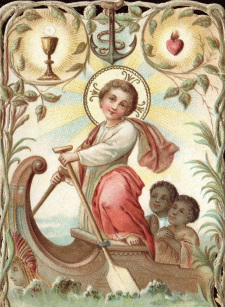 Remember, Christian soul, that thou hast this day, and every day of thy life- God to glorify- Jesus to imitate- The Angels and Saints to invoke A soul to save - A body to mortify, Sins to expiate - Virtues to acquire, Hell to avoid - Heaven to gain, Eternity to prepare for - Time to profit of, Neighbors to edify, The world to despise, - Devils to combat, - Passions to subdue, - Death perhaps to suffer, - Judgment to undergo. Jesus Keep Me, 1950 PASSION WEEK.
The third division of Lent begins with Passion Sunday; from this day on, the Church meditates exclusively on the sufferings of Christ. The Christian should also do this, and increase his practice of mortification and self-denial. From Passion Sunday on, all the crucifixes are covered, or veiled, every joyous thought should be set aside, and our minds turned to that cross which is to be erected upon Golgotha. We should meditate upon our Redeemer, Who in His sufferings concealed His divinity and clothed Himself entirely in the garb of an embassador. The crucifix is covered with violet to remind the faithful that their hearts should be penetrated with sorrow at the sufferings of Christ, and with contrition for their sins. In the office of the day the Prophecies of Jeremiah are read, the Gloria is omitted, also the psalm Judica at the beginning of Mass, unless a feast of our Lord or the Saints is celebrated. FEASTS OF SAINTS. I. Formerly the feast of a Saint was not permitted to be celebrated during Lent, because the Church wished the faithful to meditate on the Passion of Christ and awaken a penitential spirit; at present it is only Holy Week which excludes these feasts. During the rest of Lent several feasts are now celebrated. Among the most important are: (1.) The Feast of St. Joseph on the 19th of March, which was celebrated in the Eastern Church since the ninth century, but it is only two hundred years ago that its celebration became universal in the Western Church. This feast shows us the important part that St. Joseph took in the work of Redemption, for, as foster father of Jesus, as support and guardian of the Holy Family, he, next to Mary, had the greatest share in this work. Therefore, after Mary, he is our greatest intercessor with God. He is especially venerated as the patron of the dying, because he was found worthy to die in the arms of Jesus and Mary. Let us honor him so that he may nourish the work of Redemption in our hearts, and help us in completing it by a happy death. In the first centuries his feast was not celebrated, because then only the feasts of the martyrs were celebrated and principally because the celebration of his feast might lead the ignorant to believe that Joseph was the real father of Jesus. (2.) The Feast of the Annunciation, March 25th, is one of the oldest feasts of the Church; it is a feast of our Lord, as well as of the Blessed Virgin. It is in commemoration of the moment when the Angel announced to the Blessed Virgin that she was to become the mother of God. It shows us Mary's intimate participation in the redemption of mankind. The Christian should call on Mary to assist him in amending his life. According to an old tradition, on this day Adam was created, Christ became man, and died, and Mary attained to the dignity of Mother of God, therefore we should honor her more than all the other Saints. To the mystery of this day woman owes her freedom from the oppression and contempt with which she was treated in heathen times. The exalted dignity of Mary elevated the honor of womanhood. We are reminded of the mystery of this feast three times a day by the ringing of the Angelus. This custom, it is true, was instituted only in the fourteenth century by Pope John XXII; but how very appropriate it is to remind us three times a day of the Incarnation of Christ, the Son of God, who did so much for us, and whom we should not forget in the toils and labor of the day, but offer all to the Lord in gratitude. (3.) The feast of the Seven Dolors, celebrated on the Friday preceding Palm Sunday, was instituted in the fifteenth century in expiation of the crimes of the Hussite image breakers, and other atrocities. It represents the Blessed Virgin as partaking in the work of Redemption and admonishes us like her, to meditate on the sufferings of Jesus. It is called the Feast of the Seven Dolors, because it reminds us not only of the sorrows of Mary at the foot of the cross, but also of her constant participation in the sufferings of Jesus from His birth to His crucifixion. Even in the thirteenth century the Order of the Servites divided the sufferings of Mary into the following mysteries: 1st. The prophecy of Simeon in the Temple, 2nd. The flight into Egypt, 3rd. The three days loss of the boy Jesus in the Temple, 4th. The sight of her Divine Son carrying His heavy cross, 5th. The Crucifixion, 6th. The taking down from the Cross, 7th. The Burial of Jesus. 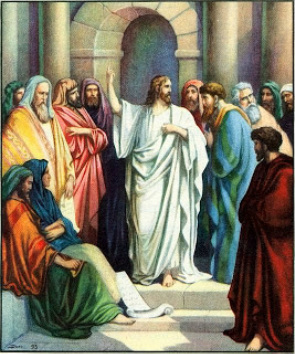 THIS Sunday, called Judica from the first word of the Intro it, is also called Passion Sunday, because from this day the Church occupies herself exclusively with the contemplation of the passion and death of Christ. The pictures of Christ crucified are covered to-day in memory of His having hidden Himself from the Jews until His entrance into Jerusalem, no longer showing Himself in public. (John xi. 54.) In the Mass the Glory be to the Father, &c. is omitted, because in the person of Christ the Holy Trinity was dishonored. The psalm Judica is not said today, because on this day the high priests held council about our Lord, for which reason the Church in the name of the suffering Saviour uses these words at the Introit: Judge me, O God, and distinguish my cause from the nation that is not holy: deliver me from the unjust and deceitful man, for Thou art my God and my strength. Send forth thy light and thy truth: they have conducted me, and brought me unto thy holy hill, and into thy tabernacles. (Ps. xlii. i. 3.) PRAYER OF THE CHURCH. We beseech Thee, Almighty God, graciously to look upon Thy family; that by Thy bounty it may be governed in body, and by Thy protection be guarded in mind. Through, &c. EPISTLE. (Heb. ix. II - 15.) BRETHREN, Christ being come, a high-priest of the good things to come, by a greater and more perfect tabernacle, not made with hands, that is, not of this creation, neither by the blood of goats or of calves, but by his own blood, entered once into the Holies, having obtained eternal redemption. For if the blood of goats and of oxen, and the ashes of a heifer being sprinkled, sanctify such as are denied, to the cleansing of the flesh, how much more shall the blood of Christ, who, by the Holy Ghost, offered himself without spot to God, cleanse our conscience from dead works, to serve the living God? And therefore he is the Mediator of the new testament; that by means of his death, for the redemption of those trangressions which were under the former testament; they that are called may receive the promise of eternal inheritance. EXPLANATION. St. Paul here teaches, that Christ as the true high-priest of the New Testament, through His precious blood on the altar of the cross, has indeed rendered perfect satisfaction for sins, but that the sinner must also do his own part, by cooperating with Christ to make himself less unworthy of participating in His passion and merits, and to appropriate to himself its fruits. This is done when he diligently and devoutly assists at the unbloody Sacrifice of the Mass, by which the fruits of the death on the cross are attributed to us; when, according to the will of the Church, he purifies his conscience by true contrition and confession; and when he seeks by trust in Christ's merits to render some satisfaction for his sins through voluntary penance and faithful following of Christ. ASPIRATION. Grant us, O meek Jesus, Thy grace, that through perfect sorrow for our sins and the ex ercise of good works we may become participators in the merits of Thy bitter passion. GOSPEL, John VIII. 46-59.) AT THAT TIME, Jesus said to the multitudes of the Jews: Which of you shall convince me of sin? If I say the truth to you, why do you not believe me? He that is of God, heareth the words of God. Therefore you hear them not, because you are not of God. The Jews therefore answered, and said to him: Do not we say well, that thou art a Samaritan, and hast a devil? Jesus answered: I have not a devil; but I honor my Father, and you have dishonored me. But I seek not my own glory; there is one that seeketh and judgeth. Amen, amen, I say to you, if any man keep my word, he shall not see death for ever. The Jews therefore said: Now we know that thou hast a devil. Abraham is dead, and the prophets; and thou sayest: If any man keep my word, he shall not taste death for ever. Art thou greater than our Father Abraham, who is dead? and the prophets are dead. Whom dost thou make thyself? Jesus answered: If I glorify myself, my glory is nothing. It is my Father that glorifieth me, of whom you say that he is your God. And you have not known him; but I know him. And if I shall say that I know him not, I shall be like to you, a liar. But I do know him, and do keep his word. Abraham your father rejoiced that he might see my day: he saw it, and was glad. The Jews therefore said to him: Thou art not yet fifty years old, and hast thou seen Abraham? Jesus said to them: Amen, amen, I say to you, before Abraham was made, I am. They took up stones therefore to cast at him: but Jesus hid himself, and went out of the temple. Why did Christ ask the Jews, which of them should convince Him of sin? To show us that he who would teach and punish others, should strive to be irreproachable himself; and to prove that He, being free from sin, was more than mere man, and therefore, the Messiah, the Son of God, as He repeatedly told the Jews, especially in this day's gospel, and substantiated by His great and numerous miracles. Why did He say: He that is of God, heareth the words of God? To prove that the Jews on account of their stubbornness and unbelief were not the children of God, but of the devil. "Therefore," St. Gregory says, "let every one when he hears the word of God, ask himself, of whom he is. Eternal truth demands that we be desirous of the heavenly fatherland; that we tame the desires of the flesh, be indifferent to the praises of the world; covet not our neighbor's goods, and give alms according to our means. Therefore examine yourself, and if you find in your heart this voice of God, then you will know that you are of God." CONSOLATION UNDER CALUMNY. WHEN Christ told the Jews the truth, He received insults and calumny; they called Him a Samaritan, that is, an unbeliever, a heretic, one possessed of a devil. This was a terrible slander, and it must have pained Him exceedingly, but at the same time it is a great consolation to those who are innocently calumniated, when they consider that Christ Himself received nothing better. St. Augustine consoles such by saying: "O friend, what is there that can happen to you that your Saviour did not suffer before you? Is it slander? He heard it, when He was called a glutton, a drunkard, a heretic, and a rebel, a companion of sinners, one possessed of a devil; He even heard, when casting out devils, that He did so by Beelzebub, prince of devils." (Matt. ix. 34.) He therefore comforts His apostles, saying, If they have called the good man of the house Beelzebub, how much more them of his household? (Matt x. 25.) Are the pains bitter? There is no pain so bitter that He has not endured it; for what is more painful, and at the same time more ignominious, than the death of the cross? For think, says St. Paul, diligently upon him who endured such opposition from sinners against himself: that you be not wearied (by all contempt and calumny), fainting in your minds. (Heb. xii. 3.) How and why did Christ defend Himself against those who slandered Him? Only by denying with the greatest modesty the things with which they reproached Him, saying that He had not a devil, that He was not a Samaritan, because He honored His Father not in their manner, but in His own. In repelling this calumny while He left the rest unanswered, Christ removed all doubt in regard to His divine mission, thus vindicating the honor of God , and securing the salvation of man. Christ thus teaches us by His own conduct to defend ourselves only against those detractions and insults which endanger the honor of God and the salvation of man,and then to defend ourselves with all modesty ; by no means however to do it, if they injure only our own good name, for we should leave the restoration of that to God, as exemplified by Christ, who knows better than we how to preserve and restore it. [See the Instruction on the Epistle of the third Sunday after Epiphany.] How had Abraham seen Christ's day? In spirit, that is, by divine revelation he foresaw the coming of Christ and rejoiced; also, he heard, by revelation from God, with the other just in Limbo, that Christ's coming had taken place, and derived the greatest comfort from it. Why did Christ conceal Himself from the Jews, instead of taking vengeance? Because the time of His death had not 'come; because He would show His meekness and patience and teach us that we should avoid our enemies rather than resist them or take vengeance on them; Christ wished to instruct us to avoid passionate and quarrelsome people, for it is an honor for a man, to separate from quarrels: but all fools are meddling with reproaches. (Prov. xx. 3.) PETITION. When Thine enemies calumniated Thee, most meek Jesus, Thou didst answer them with tender words, and when they were about to stone Thee, Thou didst depart from them, whilst we can scarcely bear a hard word, and far from yielding to our neighbor, defend and avenge ourselves most passionately. Ah! pardon us our impatience, and grant us the grace to bear patiently the wrongs done us, and when necessary, answer with gentleness for Thy glory and the salvation of our neighbor. Whom God wants to save, to that soul He sends suffering! - Joseph Farrell -
If it happens that something grieves thee, no matter from what quarter it comes, be assured that while you love God, all will turn to your good.
- St. Francis de Sales - O my God be blest when you afflict me. I love to be crushed, consumed, destroyed
by Thee. Annihilate me more and more. - General de Sonis - No good can be accomplished save by and with the Cross.
- Venerable Mother Barat - Let nothing disturb thee,
Let nothing affright thee; All things are passing; God only is changeless. Patience gains all things. Who hath God wanteth nothing -- Alone God sufficeth. - St. Teresa - Today, in the church, all the statues, pictures and even the crucifixes are veiled until Easter Saturday. That the crucifix is also hidden is the remains of the custom of hanging a curtain between sanctuary and nave during the whole of Lent. In most homes there will be a crucifix, perhaps pictures or statues. On Passion Sunday we might remove them all, and their very absence will bring our minds much more often to the thought of the Passion than would their familiar presence.
A Candle is Lighted, Imprimatur 1945 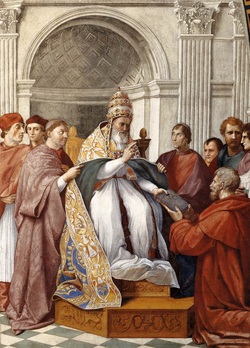 St. Gregory was born in Rome of noble parents. His father was a senator and his mother was a saint, St. Celia. Gregory studied philosophy and while still young, became Governor of Rome. When his father died, he turned his large house into a monastery. For several years he lived as a good and holy monk. Then Pope Pelagius made him one of the seven deacons of Rome, and when the Pope died, Gregory himself was chosen to take his place. The humble Saint did not want that honor at all. He was so holy and wise, however, that everyone knew he would be a good Pope. Gregory even tried to disguise himself and hide in a cave, but he was found and consecrated Pope, anyway. For fourteen years he ruled the Church. He was one of the greatest Popes the Church has ever had, even though he always was a sickly man. St. Gregory wrote many books and preached to the people constantly. He cared for people all over the world. Indeed, he considered himself everyone's servant. He was the first Pope to use the title "Servant of the servants of God." Now, all the Popes use this title. St. Gregory took special, loving care of poor people and strangers. Every day he used to feed them a good dinner. Once the Lord Himself came, dressed like one of the Saint's poor guests. This Jesus did to show St. Gregory how pleased He was with his charity. Once, when Gregory was still a monk, he saw some blonde boys up for sale in the slave market of Rome. He asked where they were from and was told that they were from England. The Saint felt a, great desire to go to England to bring the Faith to those pagans. When he became Pope, one of the first things he did was to send some of his best monks to convert the English to Christ. The last years of this holy Pope's life were filled with terrible sufferings, yet he continued working for his beloved Church until the very end. Every morning let us make the resolution to do at least one good deed of charity during the day. St. Gregory the Great, pray for us! A coloring picture can be found here. |
Holy Mother Church
dedicates the month of July to the Most Precious Blood of Jesus COPYRIGHT
The purpose of this website is to share the beautiful Catholic resources that God has so richly blessed us with. All texts unless they are my own words have their sources quoted, and most of them are in the public domain. Any educational items that I have made for or with my children are NOT TO BE USED FOR PROFIT, but are meant to be used for personal use by individuals and families. You may link to our site if you so choose. A Saint for everyday and good reading at:
Archives
July 2024
|
||||||


 RSS Feed
RSS Feed